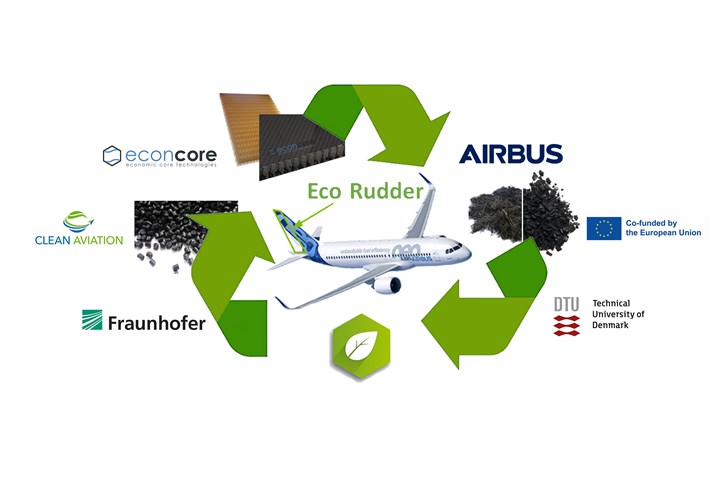EcoRudder project to develop thermoplastic composite aircraft rudder
Airbus, EconCore, Fraunhofer and the Technical University of Denmark will produce a potentially recyclable rudder from thermoplastic honeycomb sandwich composites.

Sandwich core supplier EconCore (Leuven, Belgium) is collaborating with Airbus (Toulouse, France), the Technical University of Denmark (DTU, Kongens Lingby) and Fraunhofer on a potentially recyclable rudder for an Airbus A320 aircraft, made from thermoplastic honeycomb sandwich composites.
This endeavor forms the work package EcoRudder in the project FASTER H2, which is funded by the European Union’s Clean Aviation Research Program under Horizon Europe and led by Airbus. EcoRudder focuses on the development of a new generation rudder structure for a single-aisle commercial aircraft. It is envisaged that the rudder structure will be redesigned and replaced with thermoplastic materials that have the potential to be recycled after the aircraft has been decommissioned.
Within the scope of the project, thermoplastic honeycomb sandwich structures will be produced and evaluated against the requirements for the rudder, and a recycling concept for the panels will be demonstrated. Extensive testing and analysis will be done to ensure that the materials meet all requirements for a certification in a structural aircraft component, as well as a detailed life-cycle analysis (LCA) performed to confirm the reduced CO2 footprint of the new thermoplastic honeycomb sandwich rudder.
According to EconCore, composite sandwich construction has proven to be a very efficient structural concept in structural aircraft parts. In line with today’s sustainability requirements, “green” or more sustainable/recyclable composites are expected to replace conventional thermoset materials such as phenolic resin honeycombs and epoxy laminates. This improvement in sustainability has to be achieved without compromising on mechanical requirements such as damage tolerance under extreme environments and unintended loading scenarios. Sufficient robustness and structural integrity against service loads, as well as potentially recycling of the thermoplastic constituent materials, must also be ensured.
Related Content
-
Composites end markets: Sports and recreation (2025)
The use of composite materials in high-performance sporting goods continues to grow, with new advancements including thermoplastic and sustainability-focused materials and automated processes.
-
MFFD longitudinal seams welded, world's largest CFRTP fuselage successfully completed
Fraunhofer IFAM and partners have completed left and right welds connecting the upper and lower fuselage halves and sent the 8×4-meter full-scale section to ZAL for integration with a cabin crown module and testing.
-
Plant tour: Collins Aerospace, Riverside, Calif., U.S. and Almere, Netherlands
Composite Tier 1’s long history, acquisition of stamped parts pioneer Dutch Thermoplastic Components, advances roadmap for growth in thermoplastic composite parts.

.jpg;width=70;height=70;mode=crop)











